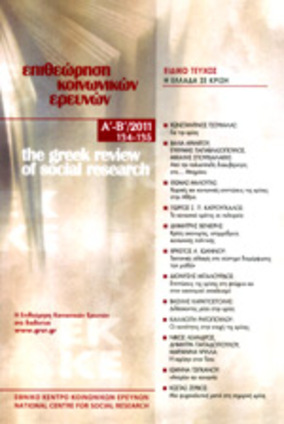No woman is illegal : Re-introducing antiracism in feminism
Part of : Επιθεώρηση κοινωνικών ερευνών ; Vol.140/141, 2013, pages 203-216
Issue:
Pages:
203-216
Parallel Title:
Καμιά γυναίκα δεν είναι παράνομη : Επανεισάγοντας τον αντι-ρατσισμό στο φεμινισμό
Section Title:
Articles
Abstract:
This is an approach of the issue of anti-racism in relation to feminism taking as example the German speaking countries. We argue that the efforts of some representatives of “feminism” to legitimize structural racism in the name of women’s rights had great acceptance in the public sphere of several European countries. In some cases this situation even created alliances between the far right and feminists. Onthe other hand, anti-immigrant policies in the name of women’s liberation generated resistance in both social movements and theoretical approaches in the field ofanti-racist feminism. Especially self-organizations of migrant women have played a leading role in the political movement against anti-immigrant measures as well in the theoretical approach to anti-racist feminism.
Subject:
Subject (LC):
Keywords:
Anti-racist feminism, migration, self-organization of migrant women, “white” feminism, women’s rights, αντι-ρατσιστικός φεμινισμός, μετανάστευση, αυτο-οργάνωση των μεταναστριών, «λευκός» φεμινισμός, γυναικεία δικαιώματα
Electronic Resources:
References (1):
- Arslanoğlu A., 2010, «Stolz und Vorurteil. Markierungspolitiken in den Gender Studies und anderswo», Outside the Box. Zeitschrift für feministische Gesellschaftskritik, no 2, pp. 2-4. Castro Varela M., Dhawan N., 2003, «Postkolonialer Feminismus und die Kunst der Selbstkritik», in Steyerl H. and Gutiérrez Rodríguez E. (eds.), Spricht die Subalterne Deutsch? Migration und postkoloniale Kritik, Münster, Unrast, pp. 270-291. Çileli S., 2008, Eure Ehre – unser Leid. Ich kämpfe gegen Zwangsheirat und Ehrenmord, Munich, Blavalent. de Souza R., 2004, «Motherhood, Migration and Methodology: Giving Voice to the “Other”», The Qualitative Report, 9 (3), pp. 463-482. Eichhorn C., 1992, «“Frauen sind die [N-Wort] aller Völker”. Überlegungen zu Feminismus, Sexismus und Rassismus», in diskus-Redaktion (ed.), Die freundliche Zivilgesellschaft. Rassismus und Nationalismus in Deutschland, Berlin, Edition ID-Archiv, pp. 94-104 Erdem E., 2009, «In der Falle einer Politik des Ressentiments. Feminismus und die Integrations debatte”», in Hess S., Binder J. and Moser J. (eds), No integration?! Kulturwissenschaftliche Beiträge zur Integrations debatte in Europa, Bielefeld, Transcript., pp. 187-207. FeMigra, 1994, «Wir, die Seiltänzerinnen», in Eichhorn C. and Grimm S. (eds), Gender Killer. Amsterdam/Berlin, pp.: 49-63. Online: http://www.nadir.org/nadir/archiv/Feminismus/GenderKiller/gender_5.html (25.07 2011). Gutiérrez Rodríguez E., 1999, «Fallstricke des Feminismus. Das Denken “kritischer Differenzen” ohne geopolitische Kontextualisierung. Einige Überlegungen zur Rezeption antirassistischer und postkolonialer Kritik», Polylog – Zeitschrift für interkulturelles Philosophieren, online: http://them.polylog.org/2/age-de.htm (15.12. 2011). Gümen S., 1998, «Das Soziale des Geschlechts», Das Argument: Grenzen 40.224, pp. 187-202. Hall S., 1996, «New Ethnicities», in Morley D. and Chen H.-H. (eds), Stuart Hall: Critical Dialogues in Cultural Studies, London, Routledge, pp. 441-449. Initiative Transnationaler Migrant_innenstreik, 2011, «1. März 2011», online: http://www.1maerzstreik.net/1-maerz-2011/ (01.03.2011). Johnston-Arthur A.-E., 2009, Offener Brief an die InitiatorInnen des miA Awards, 2009, online: http://volksgruppen.orf.at/diversitaet/aktuell/stories/81349/ (25.07. 2011). Kelek N., 2005, Die fremde Braut. Ein Bericht aus dem Inneren des türkischen Lebens in Deutschland, München, Goldman. Knapp G.-A., 1998, Kurskorrekturen. Feminismus zwischen Kritischer Theorie und Postmoderne, Frankfurt am Main, Campus. Lefö – Beratung, Bildung und Begleitung für Migrantinnen, 2010, Migrantinnenrechte sind Frauenrechte. Jahresbericht 2010, online: http://www.lefoe.at/index.php/jahresberichte.html (14.10.2011). Mia-Award, 2012, «Über die MiA», οnline: http://www. mia-award.at (12.10.2012) Neuhold P., Mendel I., 2011, «Emanzipation statt Integration. Was tun, wenn die Innenministerin “Feminismus” entdeckt?», An.schläge, no 7, pp. 10-13. nextGENDERation, 2004, Not in our names! online: http://www.nextgenderation.net/projects/notinournames/english.html (30.03.2011). no racism (2011), «Abschiebung per Sammelcharter - Informationen aus Wien», online: http:// no-racism.net/article/3642/ (20.01.2011). Oguntoye K., Ayim M., Schultz D., 1986, Farbe bekennen. Afrodeutsche Frauen auf den Spuren ihrer Geschichte, Berlin, Orlanda. Sarrazin T., 2010, Deutschland schafft sich ab. Wie wir unser Land aufs Spiel setzen, Munich, Deutsche Verlags-Anstalt. Shooman Y., 2012, «(Anti-)Sexismus und Instrumentalisierung feministischer Diskurse im antimuslimischen Rassismus», online: http://www.polsoz.fu-berlin.de/polwiss/forschung/systeme/empsoz/mitarbeiter/stoess/lehre/Shooman.pdf (12.08.2012) Yuval-Davis N., 2006, «Belonging and the politics of belonging», Patterns of Prejudice, 40 (3), pp. 196-213.




